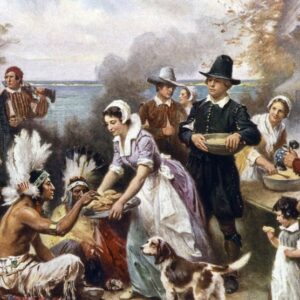 As families across the United States gather for Thanksgiving, we take a moment to reflect on the origins of this cherished tradition. For my family, the story holds particular significance, as we are proud descendants of John Howland, a Mayflower passenger whose survival and contributions shaped the Plymouth Colony’s history.
As families across the United States gather for Thanksgiving, we take a moment to reflect on the origins of this cherished tradition. For my family, the story holds particular significance, as we are proud descendants of John Howland, a Mayflower passenger whose survival and contributions shaped the Plymouth Colony’s history.
The first Thanksgiving, celebrated in the autumn of 1621, was a feast of gratitude. After enduring a brutal first winter, during which half of the Mayflower settlers perished, the survivors planted crops with guidance from the Wampanoag people. The successful harvest that followed was a milestone worth celebrating. Governor William Bradford invited the Wampanoag Chief Massasoit and 90 of his people to join the 50 colonists in a three-day festival of food and fellowship.
The menu at this inaugural Thanksgiving was vastly different from what we enjoy today. There was no pumpkin pie or mashed potatoes, as the settlers lacked the sugar and dairy needed for such dishes. Instead, the feast likely included wild turkey, duck, or goose, which were abundant in the region. Shellfish, including clams and mussels, graced the table, along with roasted venison provided by the Wampanoag. Seasonal vegetables like squash, beans, and corn were staples, reflecting the harvest’s bounty.
This meal was more than sustenance—it symbolized hope, resilience, and gratitude. For the settlers, it marked survival against overwhelming odds. For the Wampanoag, it was a gesture of alliance and mutual respect.
As descendants of John Howland, who famously survived being swept overboard during the Mayflower’s journey, we cherish this legacy of perseverance and unity. This Thanksgiving, as we enjoy our modern feasts, let us honor the spirit of that first celebration—a reminder of gratitude, community, and the blessings of harvest.

